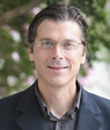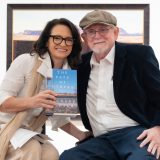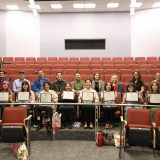Dr. Chris Bader Awarded Two Grants totaling $945,515
August 12, 2024
 Dr. Chris Bader (Sociology) received two grants totaling $945,515 from the John Templeton Foundation and Templeton Religion Trust for “Using the Association of Religion Data Archives (ARDA) to Strengthen the Religion Research Community.” These awards are part of larger $1,601,031 John Templeton Foundation and $782,086 Templeton Religion Trust awards to Dr. Andrew Whitehead at Indiana University.
Dr. Chris Bader (Sociology) received two grants totaling $945,515 from the John Templeton Foundation and Templeton Religion Trust for “Using the Association of Religion Data Archives (ARDA) to Strengthen the Religion Research Community.” These awards are part of larger $1,601,031 John Templeton Foundation and $782,086 Templeton Religion Trust awards to Dr. Andrew Whitehead at Indiana University.
“I am thrilled to have received this recent grant from the John Templeton Foundation and Templeton Religion Trust,” said Dr. Bader. “The goal of this project is to improve the resources and quality of data in the interdisciplinary study of religion. Further, this project has a strong focus on promoting and encouraging open science practices. We will be working with the Center for Open Science to encourage the submission of replication data in the social sciences and access to free, quality data on religion across the world.”
The Association of Religion Data Archives (ARDA) is a free online database that strives to democratize access to the best data on religion. Founded as the American Religion Data Archive in 1997 and going online in 1998, the initial archive was targeted at researchers interested in American religion. The targeted audience and the data collection have both greatly expanded since 1998, now including American and international collections submitted by the foremost religion scholars and research centers in the world.
This project proposes three major initiatives that build upon and complement existing ARDA features and services. The initiatives include
- Building on the strengths of the current Data Archive
- A new vision and new tools for archiving and discovering data and measures
- Expanding partnerships that promote the discovery, sharing, and securing of data in the research community
Building on the Strengths of the Current Data Archive: The ARDA’s Data Archive has been its central feature for nearly 25 years. Its more than 1,200 curated data files are downloaded more than 30,000 times each year and have been cited in 661 different research journals since 2009. Partnering with Dr. Tom Clark at The University of Sheffield to aid in the discovery and curation of new data collections, this project will strengthen the Data Archive by adding 100 new, curated data files and optimizing the speed with which data and metadata are displayed. Relying on the curated data, this project will also maintain, update, and expand online data visualization and download tools.
New Tools for Archiving and Discovering Data and Measures: This project will build two new portals for increasing users’ access to new data sources. First, the project team will create a Submission Portal wherein users can self-submit replication data, experimental data, or any other data associated with research projects. Second, they will create a Discovery Portal that allows adding metadata for religion-related studies that are not currently archived at the ARDA. Third, they will develop improved measurement tools to help tag measures as data and metadata are added to the archive. With these tools in place, the ARDA will become a central hub where researchers go to find any data and measures of relevance to their project and allow academic journals to increase their standards for data sharing, openness, and transparency.
Building Community through Partnerships: The ARDA’s recent site rebuild and new vision for archiving and discovering data open new opportunities for building partnerships that facilitate cooperative connections in the research community. The ARDA will partner with the Global Flourishing Study and Center for Open Science to help archive and publicize findings. A partnership with the Association for Religion, Economics, and Culture (ASREC) will promote replication and transparency among economists of religion and seek data from economists. A newly developed API will provide location-based religion information to Databrary and others. These partnerships will better connect the research community and will greatly expand the ARDA’s reach.

